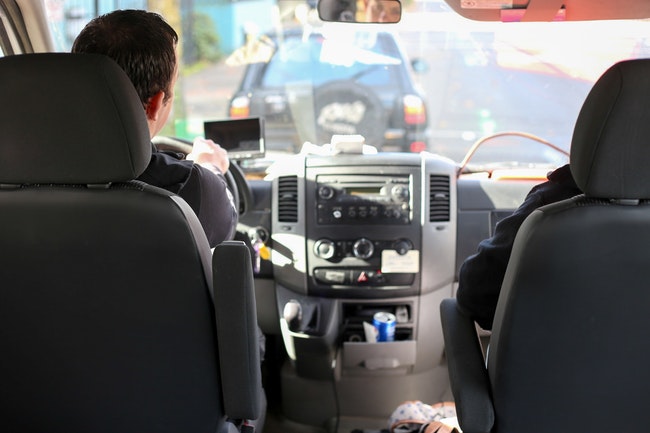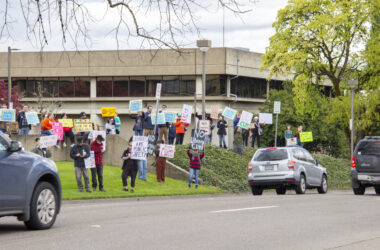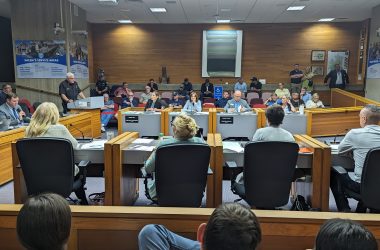
Brenton Gicker, left, prepares to pull CAHOOTS van toward a 911 call at Eugene Public Library. (Troy Brynelson/Salem Reporter)
The Salem Budget Committee Wednesday evening unanimously voted to set aside $135,000 for a mobile response unit that would send a crisis worker and EMT to calls of people in mental health crisis instead of police.
The amount the budget committee recommended, which still needs to be approved by Salem City Council, falls hundreds of thousands of dollars short of what’s needed to get the program up and running. A proposal by United Way of the Mid-Willamette Valley put that figure at $542,000 for a 16-month pilot.
Many committee members said they wanted to see what state and federal funding would come through before dedicating more city dollars toward such a program.
There have been calls for a crisis response unit in Salem for years, with nearly 100 people writing to the budget committee to ask members recommend funding for a program and hundreds more signing on to a petition. A similar program in Eugene, CAHOOTS, has received national attention over the past year as more cities seek alternatives to calling police for mental health concerns.
Committee members say they’re in agreement on wanting a program, but are still uncertain where the funding is going to come from.
The proposal from United Way of the Mid-Willamette Valley included in budget committee documents calls for one van to operate 11 hours per day Monday through Saturday with one crisis worker and EMT per shift. The program is called Community Response United.
The calls would be routed through the 911 dispatch center and services would include crisis counseling, suicide prevention, welfare checks, substance abuse issues and referrals to other service providers.
United Way’s pilot budget includes costs for the van, wages, and administration.
Councilor Vanessa Nordyke initially made a motion for the committee to include $500,000 for the program in the “Safe Communities” section of the budget, which includes the city’s public safety expenses.
Salem plans to spend $137 million next year to pay for police, fire, 911 and municipal court.
She said even if the city didn’t expend the full amount, it would be there if other funding sources fell through.
“If we end up using less than that, great,” she said.
A bill in the state Legislature, HB 2417, would provide matching funds for mobile response units through a competitive grant process. In January, the House Behavioral Health Committee voted unanimously in favor of the bill. Currently, it is being considered by the Legislature’s budget writing committee.
Councilor Chris Hoy said the city’s Legislative committee has been working hard to secure funding for the project.
“I’m just not wanting to allocate resources that might not be necessary and to say that if it’s not in the budget it doesn’t happen, well okay, but we can amend the budget at any time during the year that these resources would become available,” Hoy said.
Mayor Chuck Bennett said millions of dollars from the American Rescue Plan, federal Covid relief money passed by Congress in March, will be coming to the county and city.
During the first budget committee meeting, members expressed concerns over using the one-time money for an ongoing cost like operating the response unit.
Bennett said the budget committee should make a commitment that they’re going to move ahead with the program and budget $1, without indicating how much the city would spend out of its general funds until it knows what state and federal funding it could leverage.
“Budget this at the time you’ve actually got a real understanding of what kind of funding opportunities you’ve got,” he said.
Bennett said if funding falls through, the council could dip into the contingency fund to finance the additional money needed.
He said one of the problems has been determining how much money is needed to set up the right program and give it durability over the next couple of years.
City Manager Steve Powers said the proposal from United Way contains some inaccuracies. It lists partners who are no longer operating or haven’t agreed to participate in the program.
“The proposal itself, in my judgement, needs some work,” Powers said.
Nordyke said the money the city is considering through the state is still pending in the Legislature and there’s no guarantee Salem will prevail in the grant process, which could further delay the start of the project.
She said United Way wants to get the project going by Aug. 1.
“I feel like we’ve provided the detailed proposal this time. We’ve heard from a number of people in the community that are urging us to adopt this. We have the time and the resources to do this and it’s high time we do,” Nordyke said.
Previous coverage:
Salem residents call for a crisis response team in city budget
‘You want a resolution as much as possible’: Six hours with Eugene’s mobile crisis intervention team
Salem nonprofits looking at Eugene’s model for mobile crisis response
Contact reporter Saphara Harrell at 503-549-6250, [email protected].
BE PART OF OUR TEAM FOR SALEM’S BENEFIT: Accurate local information is vital for any community and that’s harder to come by in this day of “anyone can post anything” to social media. People in communities without trained journalists working for them don’t have accurate, trusted information. Help Salem avoid that fate – join in putting fuel in the tank of Salem Reporter to keep it growing, going strong. Here’s how:
SUBSCRIBE: A monthly digital subscription starts at $5 a month.
GIFT: Give someone you know a subscription.
ONE-TIME PAYMENT: Contribute any amount and you support giving the people of Salem local news otherwise missing. (You can also mail your contribution: Salem Reporter, 72585 Middle Fork Lane, Bates OR 97817)









